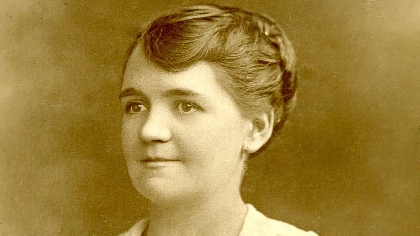
Asbestos was finally banned in the UK in 1999, with people exposed to asbestos dust typically fall ill decades later. Asbestos diseases still kill over 5,000 people in the UK every year.
The dangers of asbestos were known for decades before it was finally banned. Nellie Kershaw was born in 1891, and fell ill while working at the Turner & Newall asbestos factory in Rochdale. She died, aged 32-33, on 14th March 1924.
Nellie’s case was the first death from asbestosis to be reported in medical literature with her case being widely reported in the press and in the British Medical Journal at the time. The asbestos industry flourished, despite Nellie’s death.
In 1924 Turner & Newall employed 5,000 workers. By 1970 it employed 36,775 around the world, and they boasted major sites in Rochdale, Hindley Green, Trafford Park, and Chapel-en-le-Frith iii From 1957, Turner & Newall worked with Cape and other asbestos manufacturers through the Asbestosis Research Council (ARC).
From 1966, the ARC successfully lobbied the UK government against a proposed “no dust policy”, in favour of less stringent regulation. Had tougher regulation been brought in then, the ban on asbestos could have been achieved much sooner.
Buildings built before the 1999 ban still contained asbestos materials. There are concerns that as these materials deteriorate, or are disturbed, that people living and working in those buildings will be put at risk of developing the terminal asbestos-related cancer mesothelioma.
Deaths from mesothelioma will continue for decades to come. There is an ongoing campaign by asbestos victims to get Cape, the former asbestos manufacturer now owned by Altrad, to donate £10 million to mesothelioma research. Turner & Newall no longer exists, and so cannot be asked to donate.
Quotes from people affected by asbestos disease: "I worked as a bookie all my life. Asbestos isn't just a risk to blokes who've worked in heavy industry. If I can get mesothelioma, no-one is really safe. We should be getting asbestos out of public buildings like schools. We should be investing in medical research, because this disease is going to get more people in years to come". Barrie Taylor, mesothelioma patient, 72, Denton.
"I lost my Dad to mesothelioma in 2019. I still think about him every day. No-one should have to lose a loved one like this. If the right lessons had been learnt from what happened to Nellie Kershaw 100 years ago, my Dad might still be here today". Susan Aspinall, Atherton
"My Dad had mesothelioma. I lost him in 2021. If asbestos companies like Turner Brothers and Cape hadn't hidden the dangers, my Dad might still be here today. The companies responsible should help find new treatments for this terrible disease". Su Phillips, Wigan
“Nellie’s death was when government should have stepped in with stronger regulation of the growing asbestos industry. Fewer people would have been put in harm’s way if the right lessons had been learnt back then. We should not have had to wait another 70 years for the asbestos ban.” Rob Rayner, co-ordinator of the Greater Manchester Asbestos Victims Support Group.
Remembrance events are being held tomorrow at 12:30pm in Stevensons' Square Manchester, and at 4:30pm in Rochdale Memorial Gardens.


 Curzon under 7's raise £5K for Cancer Research UK
Curzon under 7's raise £5K for Cancer Research UK
 Rail chaos coming on Sunday
Rail chaos coming on Sunday
 Rotary club steps up to rebuild reading shed for tornado-hit school
Rotary club steps up to rebuild reading shed for tornado-hit school
 Mum pays tribute to 'role model' son, 15, following death
Mum pays tribute to 'role model' son, 15, following death

